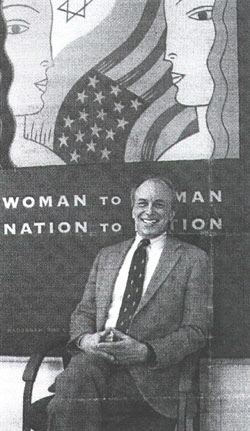Class News
One man in a woman's world
Danforth is only male in college women's studies department
Weston Town Crier
May 3, 2001

Nicholas Danforth may live on a Weston farm, but his life is anything but that of a typical farmer.
Last month Danforth left for Egypt. where he is working as part of a team designing one of the largest population control and family planning projects in history. He will focus much of his energy teaching the Egyptians about contraception and birth control.
Two months ago Danforth joined Brandeis University's staff as a visiting professor specializing in women's studies. He is the only male member of the Waltham university's department.
To understand the source of his interest in women's issues, one doesn't have to look far from his farm in Weston.
"I think it goes back to my childhood," he said. "I grew up with three terrific sisters, and I learned a lot about gender from them."
Danforth says his sisters, Nina. Julie, and Lynn, taught him respect for women. "I learned there were more similarities than differences between men and women," he said.
Danforth left Weston at age 14 and returned in 1997, less than 40 years later. He went to Phillips Academy at Andover, then to Yale University and Columbia. While in school, he began to become fascinated with Africa, receiving both his undergraduate and graduate degrees in African studies.
At the tender age of 17 he made his first journey to Africa, and soon began visiting every summer. He often worked as a laborer or in hospitals. One summer, he worked at a missionary hospital in Cameroon, an experience that opened his eyes to a whole world of problems.
"1 began to see the unbelievable suffering of women," he said. "Women were suffering from too many pregnancies, unsafe abortions and malnutrition."
He noticed many of the issues that plagued women were reproductive ones, and he began to take an interest in that area.
After he graduated from Columbia, he spent two years in Lesotho, a small African country surrounded on all borders by South Africa.
"There, I saw problems from unplanned pregnancies first hand," he said.
It was there, too, where he heard a story he says changed his life.
A woman was murdered by her husband, he was told, after he came home from work and found a container of birth control pills hidden in the bottom drawer of her dresser. The man thought this meant she was cheating on him and killed her.
"On one hand, I was concerned about women's health issues and the women's movement," he said, "but I also realized that we needed to improve men's attitudes as well if we were to empower women."
He came back to the United States and moved to New York City. He got involved with reproductive health issues and became director of the Population Law Center, the organization that brought Roe v. Wade to the Supreme Court, the law that made abortion legal in the United States.
He began working for the United States Agency for International Development as a program designer, and began a career that has taken him to more than 20 developing countries to try to improve conditions for women.
But after a career that was primarily spent working to empower women in developing countries, Danforth turned his attention to men in the past 10 years.
"I realized that we were neglecting men," he said, adding that men play as important a role in reproductive health as women.
He began teaching African men about condoms and birth control, the same lesson he had been teaching women for years.
"In an era of HIV/AIDS, it's men as well as women who will die if they don't use condoms," he said.
In addition to these lessons, he spent time teaching men about parental care, aiding women in childbirth and about children's health.
"A simple thing a husband can do (in developing companies) is give the woman bus fair to take their child to get immunized," he said. "Or even better, the husband can take the child."
Another area he focused on was gender violence. "Often, the violence is related to reproductive and sexual health," he said.
Danforth represented the United States at the United Nations Women's Conference in Copenhagen, Denmark, in 1980. He was the only male at the conference. A few years ago he attended the Women's Conference in Beijing, China, with former First Lady Hillary Clinton.
His wife, Turid Sato, originally from Norway, who worked with him in developing countries as a representative of the World Bank, died m 1997, changing Danforth's life considerably. He said his son, Tom, needed to be around family and so he moved back home to his family's farm on Wellesley Street in Weston.
He has since stopped working overseas and has stayed home with his son, who will graduate Weston High School this June. This trip to Egypt will be the first he has taken since 1997.
After his son graduates. Danforth hopes to once again work in the developing world. He has turned down offers to participate in efforts in Haiti, Jamaica, Guatemala and Bangladesh during his stay in Weston.

